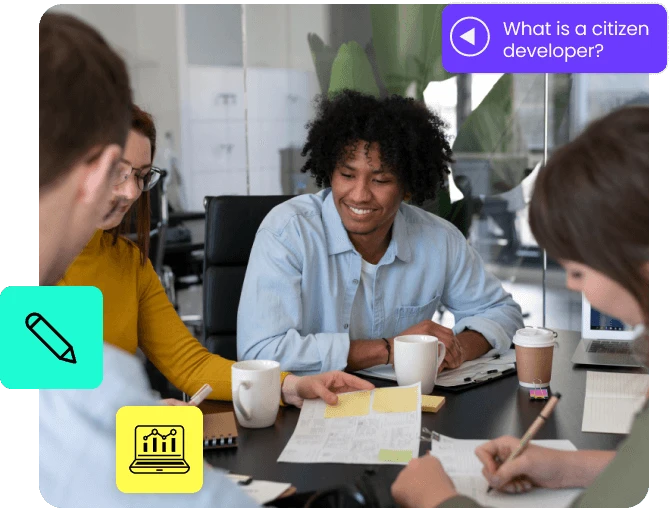What is a citizen developer?
A citizen developer is an employee who develops an application for themselves or anyone else in a company. They use tools permitted by IT units and usually report to a department or area of business that isn’t IT.

Table of contents
- What is a citizen developer?
- What is a citizen developer framework?
- Citizen developer certification
- Citizen developer skills
- What is citizen developer RPA?
- What is citizen developer governance?
- How do I become a Microsoft citizen developer?
- What is a citizen developer in UiPath?
- What tools do citizen developers use?
- Digital transformation and citizen developers
- Conclusion
Businesses typically use citizen developers to manage IT backlogs and to make up for a lack of in-house developers. To create profitable and productive apps and automate workflows, citizen developers need to know about business processes and have advanced digital skills, including:
- No-code bot automation
- Digital workflow analytics
- Document generation
What is a citizen developer framework?
There are four key framework elements of citizen development:
- The use of no-code development platforms
- The powering of users using low-code platforms
- The use of low/pro code to support business requests
- The use of pro code to improve the company’s technology
Citizen developer certification
Citizen developer certifications are generally administered by the US Project Management Institute (PMI). They offer a broad range of certificates with three tiers: foundation, practitioner, and business architect.
PMI certified citizen developer courses allow users to utilize no-code/low-code platforms to build applications without software expertise. The benefits are immense and include faster developments that are streamlined at a fraction of the usual cost.
Citizen developer skills
Enterprises and small to medium-sized businesses worldwide are investing in citizen development teams to upend business practices and prepare for their digital transformation. Successful citizen developers typically have specific skill-sets, including:
- Advanced knowledge of business operational needs and processes
- Advanced digital skills
- The ability to collaborate across teams and departments
- Motivation to upskill
What is citizen developer RPA?
A Robotic Process Automation (RPA) citizen developer is a non-professional RPA developer who generally builds applications used by other people. RPA citizen developers have various tools at their disposal and spend their time analyzing business processes, identifying automation recourse, defining value proposition, and reengineering RPA driven processes.
What is citizen developer governance?
Citizen developer governance transforms blighted shadow IT projects into stable and secure apps that obey corporate policies and guidelines. Governance policies guarantee that IT departments are protecting valuable data, appropriately testing apps, and following a stringent approval process.
Clear, definable, and measurable governance policies establish quality control and assurance over citizen development teams and individuals
How do I become a Microsoft citizen developer?
Digital transformation has changed the idea of modern business practices, leaving organizations under a lot of pressure to upskill and reskill existing employees. Challenges brought on by the lack of professional software developers on the market has seen citizen development culture dramatically rise.
There are four ways to empower no-code citizen developers:
- Leverage standard toolsets – Development staff should be notified about and given access to standard low-code/no-code tools.
- Explore hyper agility – Intelligent automation should be integrated with agile practices and transition to smart enterprise.
- Maintain proper governance and control of shadow IT – Prohibit the use of systems, devices, apps, and services that aren’t approved by IT.
- Empower no-code developers – Facilitate mentorship programs and enduring support from IT.
What is a citizen developer in UiPath?
The citizen development flow has been formulated to encourage users from within an organization to share citizen-developed automation that promotes, fosters, and stimulates day-to-day tasks. UiPath is a progressive RPA tool that allows users/citizen developers to automate a myriad of business processes.
Citizen developers can utilize UiPath to immerse themselves in an open-source platform that stimulates collaboration and automates duplicative tasks.
What tools do citizen developers use?
Citizen development platforms are being increasingly used to enhance and expand business processes and interactions.
The following tools, usually referred to as point-and-click platforms due to their ease of use, are available to citizen developers:
- Mendix – Mendix expedites application delivery and changes within an organization, cutting out the need for professional IT developers.
- Microsoft PowerApps – Microsoft PowerApps is a low-code platform that’s easy to use for non-technical staff. This allows professional developers to interact with metadata and create custom connectors.
- Nocode Essentials – Nocode Essentials are an assortment of resources that encompass no-code and low-code tools and techniques.
Digital transformation and citizen developers
In recent years, digital transformation has accelerated beyond expectations and helped businesses revamp their business practices in line with digital-first.
But understaffed and often overworked IT departments have limited access to resources, which means that more organizations are relying on citizen developers to innovatively confront their digital transformation needs.
80% of surveyed organizations are now partnering with citizen developers.
Conclusion
A shortage of skilled developers and a lack of IT resources aren’t the only components that are contributing to the citizen developer movement. Digital transformation affects a lot more than automating top-level processes and involves automation at the departmental and individual levels too.
Citizen developers are perfectly suited to execute these repetitive tasks whilst enhancing job satisfaction and productivity.